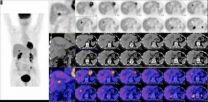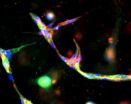(Press-News.org) Disorganised and emotionally unstable, poorly adapted, suffering from alcohol problems, impulsive, or with a "globally adapted" personality. These are the features of the four diagnosed types of compulsive gamblers identified by researchers at the University Hospital of Bellvitge (IDIBELL) and the Autonomous University of Barcelona (UAB). According to the scientific team, only one of these four shows signs of a significant pathology.
"We need to use different treatments for each sub-group of pathological gamblers in order to respond to their specific therapeutic difficulties and needs", Susana Jiménez Murcia, co-author of the study and coordinator of the Pathological Gambling Unit at the Bellvitge-IDIBELL Hospital in Barcelona, tells SINC.
The results of the study, which has been published in the Canadian Journal of Psychiatry, show that it is possible to distinguish four groups of pathological gamblers based on their personality traits and associated psychopathology.
According to the researchers, who studied 1,171 people, types I and II are pathological gamblers who exhibit problems in controlling their responses, "but only type II shows signs of a significant concurrent psychopathology", with high levels of impulsiveness and sensation-seeking.
Resisting the urge to gamble
Pathological gambling has been defined as a progressive and chronic collapse in the ability to resist the urge to gamble. It is a kind of behaviour that damages and harms personal, family and career-related goals (APA, 2000). In mental illness manuals, pathological gambling is classified as a "disruption in the ability to control impulses".
"However, this classification has generated a certain degree of polemic among the scientific community, due to the high degree of heterogeneity that exists in this disorder", the researcher explains.
For this reason, the scientific community is now looking into the possibility of introducing a new diagnostic category called "behavioural and substance addictions" in the new editions of manuals such as the Quinto Manual Diagnóstico y Estadístico de los Trastornos Mentales (DSM-5) (Fifth Diagnostic and Statistical Manual of Mental Disorders).
Four kinds of compulsive gamblers
Type I, which could be called 'disorganised and emotionally unstable', is characterised by schizotypal personality traits, high degrees of impulsiveness, alcohol and substance abuse, psychopathological alterations and early onset age.
Type II, which is a schizoid type, exhibits high levels of harm avoidance, social distancing, and alcohol abuse.
Type III is reward-sensitive, and is characterised by high levels of sensation-seeking and impulsiveness, although without any psychopathological alterations.
Type IV is a high functioning, globally-adapted personality type, without any disorders relating to substance abuse, and no associated psychopathological alterations.
INFORMATION:
References:
Eva Mª Álvarez-Moya, Susana Jiménez-Murcia, María Neus Aymamí, Mónica Gómez-Peña, Roser Granero, Juanjo Santamaría, José Manuel Menchón y Fernando Fernández-Aranda. "Subtyping Study of a Pathological Gamblers Sample". The Canadian Journal of Psychiatry, Vol 55, No 8, agosto de 2010.
4 kinds of compulsive gamblers identified
2010-10-15
ELSE PRESS RELEASES FROM THIS DATE:
New malware could steal users social media behavior and info -- Ben-Gurion U. researchers
2010-10-15
BEER-SHEVA, ISRAEL, October 14, 2010 -- A new study by Ben-Gurion University of the Negev (BGU) researchers predicts that a new generation of malware (software written for malicious purposes like identity theft) could steal data on human behavior patterns, which is more dangerous than traditional, detectable attacks.
In the newly published paper, "Stealing Reality," Dr. Yaniv Altschuler and Dr. Yuval Elovici from BGU discuss malware threats that extract personal information about relationships in a real-world social network, as well as characteristic information about ...
New method is found for accurate diagnosis of gall bladder cancer, 1 of the most deadly
2010-10-15
Researchers a the University of Granada and the Department of Nuclear Medicine, Hospital Virgen de las Nieves at Granada found that the metabolic imaging diagnosis technique –based on the analysis of a structural analog of glucose labeled with a positron-emitting compound (18F)– allows early diagnosis of gall bladder cancer, a relatively rare disease with high mortality rates among most patients suffering from it.
For the purpose of this study, 62 patients were subjected to this scanning method, which represents the largest sample of patients with gall bladder cancer ...
Asteroid collision forensics
2010-10-15
In the first half of February 2009, two asteroids collided in a region of space beyond the orbit of Mars, as scientists from the Max Planck Institute for Solar System Research (MPS) in Germany have now discovered. The researchers were able to pinpoint the exact date of the impact more precisely than ever before. The debris of the crash had attracted the attention of scientists worldwide. Together with the largest earthbound telescopes and the Hubble Space Telescope, the OSIRIS camera system onboard ESA's space probe Rosetta, that was developed and is now operated under ...
New research helps clinicians predict treatment outcomes for children with OCD
2010-10-15
VIDEO:
New research from the Bradley Hasbro Children's Research Center may help clinicians better predict how a child with obsessive compulsive disorder (OCD) will respond to some of the most commonly...
Click here for more information.
EAST PROVIDENCE, RI – New research from the Bradley Hasbro Children's Research Center may help clinicians better predict how a child with obsessive compulsive disorder (OCD) will respond to some of the most commonly used treatment approaches. ...
University of East Anglia makes cancer breakthrough
2010-10-15
Scientists at the University of East Anglia have made an important breakthrough in the way anti-cancer drugs are tested.
A tumour cannot grow to a large size or spread until it has developed its own blood supply and leading research has looked for a way of halting capillary formation to stop tumours taking hold.
But new findings published today in the Journal of Cell Science have shown that scientists testing such treatments may not have been studying exactly what they thought they were.
The research proves that cells are able to switch their genetic profile – ...
OCTANE study influences revision of WHO guidelines for treating some HIV-infected women
2010-10-15
Findings from a study, which appear in the Oct. 14, 2010 New England Journal of Medicine, helped influence the World Health Organization (WHO) to change its guidelines this year for the treatment of HIV-infected women who receive a single dose of the antiretroviral drug nevirapine to prevent HIV transmission to their babies. The study demonstrated that the single dose of nevirapine used to prevent mother-to-child transmission of HIV can hamper the drug's effectiveness if it is also used later as part of a regimen to treat these same individuals.
The Phase III study, called ...
Biomarker shows potential for early diagnosis of lung cancer
2010-10-15
CHAPEL HILL, NC – A collaboration between physicians and scientists at UNC Lineberger Comprehensive Cancer Center and the University of Texas M.D. Anderson Cancer Center has demonstrated that a biomarker called TCF21 may be used to develop a potential screening test for early-stage lung cancer.
Despite the fact that lung cancer is the leading cause of cancer deaths worldwide, early-stage lung cancer is difficult to diagnose. A number of proposed screening tests, including screening CT scans and serum markers, have not shown any benefit in enhancing patient survival.
TCF21 ...
Not all doctors follow cancer screening guidelines
2010-10-15
Only one-fifth of primary care physicians in the US follow practice guidelines for colorectal cancer screening for all the tests they recommend, according to Dr. Robin Yabroff from the National Cancer Institute and her colleagues. About 40 percent followed guidelines for some of the tests they recommended and the remaining 40 percent did not follow guidelines for any of the screening tests they recommended. Furthermore, their analysis1 of physician screening recommendations for colorectal cancer shows that many clinicians either overuse or underuse screening. Their findings ...
Orchid tricks hoverflies
2010-10-15
Even Darwin was a self-admitted orchid lover. Dictionaries describe orchids as exotic ornamentals. Indeed, these plants – more than 30000 different species are thought to exist – are exotic due their extraordinary and diverse flower morphology. However, they are also exotic from a point of view other than beauty: as crafty imposters in order to achieve reproduction and to make sure that their ovaries are pollinated. Orchids depend on the assistance of pollinators, and like many other flowering plants, attract insects.
Epipactis veratrifolia, an orchid native in South ...
The kids are all right: Few negative associations with moms' return to work after having children
2010-10-15
WASHINGTON – Children whose mothers return to work before their offspring turn 3 are no more likely to have academic or behavioral problems than kids whose mothers stay at home, according to a review of 50 years of research.
"Overall, I think this shows women who go back to work soon after they have their children should not be too concerned about the effects their employment has on their children's long-term well-being," said psychologist Rachel Lucas-Thompson, PhD, lead author of the study conducted with Drs. JoAnn Prause and Wendy Goldberg at the University of California, ...





